What will be the most important change in marketing in 2024?
Welcome to the first in our 2024-cast series. We asked a range of marketers in Scotland for their predictions for 2024, and how it will change the industry. In this blog, experts from Thermo Fisher Scientific, Vault City, Wonderworks Communications, Flourish Marketing and more share their predictions on how the industry will change.
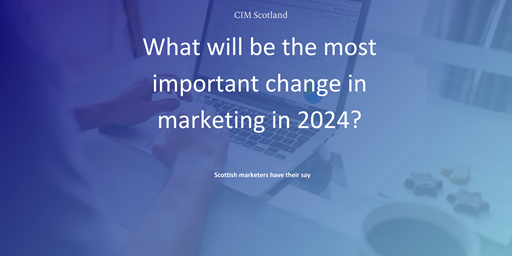
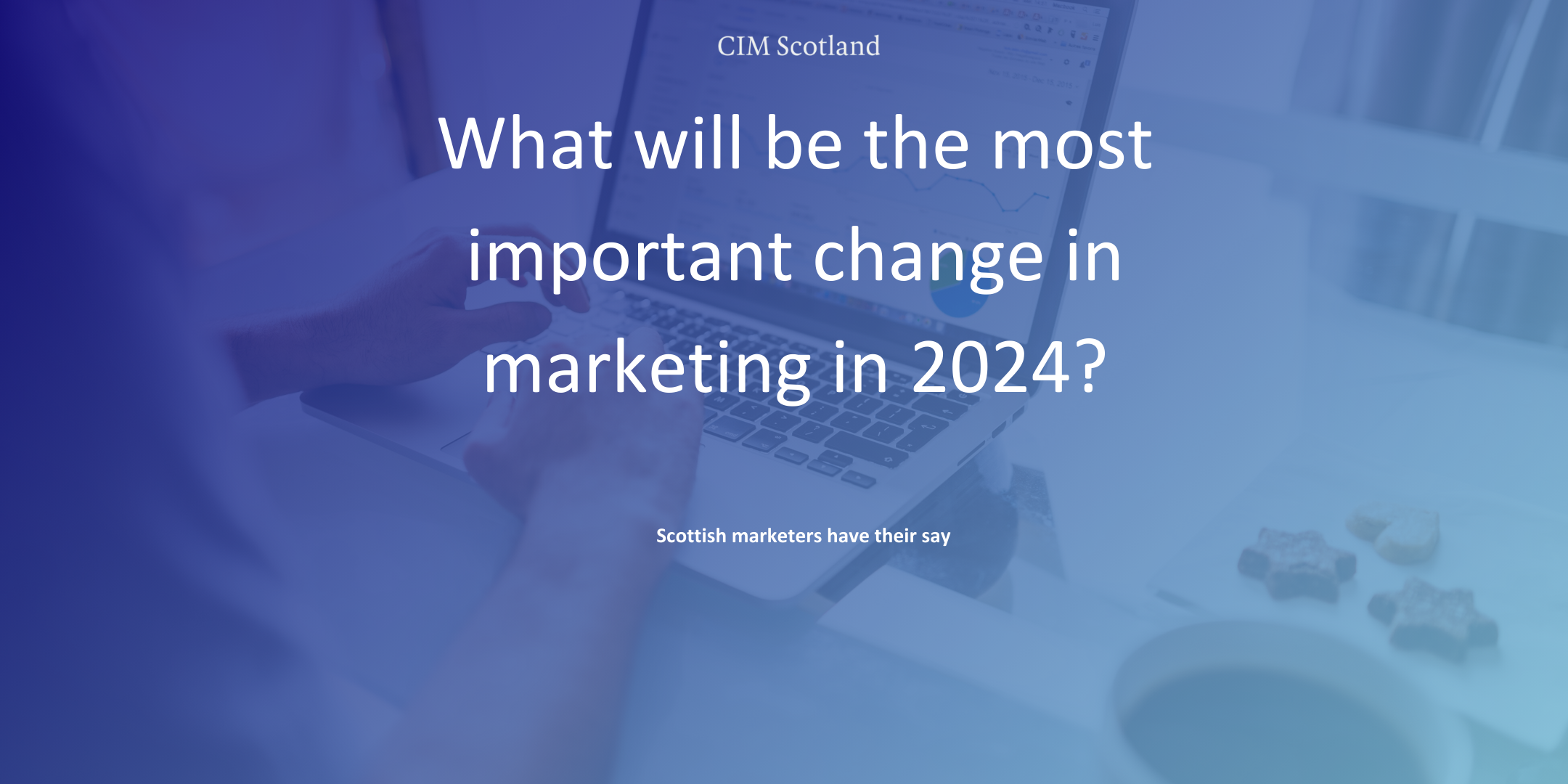
The rise of AI – but with people at its heart
It will come as a surprise to nobody that AI is predicted to be an important element in marketing for 2024. As of July 2023, about half (51%) of marketers were using – or at least experimenting – with generative AI tools.
“I believe in 2024 we will see the widespread adoption of technological advances in Artificial Intelligence (AI), Data Science and Virtual/Augmented Reality (VR/AR). While I don’t think these technologies are ‘new’ and companies who have already been at the forefront of adopting them will have much bigger success in 2024. However, as the technology has caught up and become more readily available, we will see an influx in their use. For AI, I think we are already seeing that in content generation through tools like ChatGPT and Midjourney,” said Craig Graham, Regional Marketing Manager at Thermo Fisher Scientific.
A study by Salesforce found that marketers are using generative AI for basic content creation and to write copy (76%), as well as to inspire creative thinking (71%). At the same time, 63% use it to analyse market data.
“Personally, I think 2024 will be the year of marketer’s exploring the utilisation of AI in terms of content creation - in particular support with narrative building and visual asset design. Without restricting internal or human resource skills, marketers will use the advances in AI development to enhance or compliment existing business marketing activity – although I’m all for this, I feel as a profession we need to monitor the value and ensure whatever is created looks real – reads and sounds relevant,” said Frank Gormanley, Founder of Forever Great.
Richard Wardrop, Head of Marketing at Vault City Brewing, agreed, adding: “I also believe this could create room for counterculture, and a desire for something more authentic in 2024 – especially when it comes to tone of voice and copy.”
So, how will this work and what will it mean for brands (and marketers!)? It will all come down to knowing what can be done using artificial intelligence to speed up processes, and what needs a human touch.
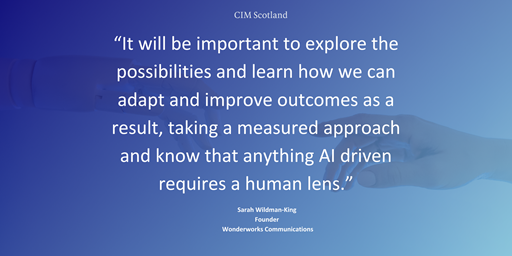
Research from Dentsu found that 75% of consumers (and 69% of Chief Marketing Officers) think that it should be disclosed to consumers if a branded piece of content, such as an advertisement, was created using AI. Similarly, 78% of consumers (and 73% of CMOs) believe that it should be disclosed if they are having a conversation powered by AI, such as a chatbot or a virtual influencer.
GWI’s December 2023 Zeitgeist found that in the UK only 30% of the public think that it is appropriate to use an AI tool for customer service responses, while 18% believe it is appropriate to use AI for social media posts.
Sarah Wildman-King, Founder, Wonderworks Communications, believes that this will bring fundamental changes to marketing and the creative process.
“It will be important to explore the possibilities and learn how we can adapt and improve outcomes as a result, taking a measured approach and know that anything AI driven requires a human lens; we will need to work with the data, insights, creative etc. to make sense of it, not rely on AI to do the job of an emotionally driven human,” she advised.
She’s not alone in thinking this: Saleforce noted that 66% of marketers surveyed felt human oversight is necessary in order to successfully use generative AI, with its lack of human creativity and contextual knowledge named as barriers.
Consumers will be more savvy on sustainability and ethics
A brand’s commitment to certain values is beginning to play more of a role in customer purchases. GWI’s February 2023 Zeitgeist discovered that for 24% of those surveyed, a brand’s commitment to sustainability played a major impact in their decision to buy a product, while 19% said a brand’s position on social issues would majorly influence their decision to purchase.
“Ethical marketing will continue to be a focus in 2024 and beyond. More and more consumers are looking to unpack brands and really see what they’re doing to conserve our planet – from supply chain logistics, to their employment practices, how inclusive they are to how they find their place in the community and the causes they stand behind,” said Ellie Murphy, Director at Flourish Marketing and CIM Scotland Chair.
Social media, news articles, company website and TV ads were named as the top way that adults want to learn more about the sustainability efforts of brands, according to US research by Viant.
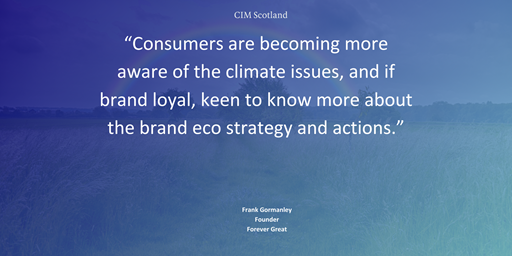
“Sustainability will also continue to form part of our conversations in 2024 and beyond as we all remain eager to look at ways of being greener and planet focused – yet still adding value to our customers portfolio. Consumers are becoming more aware of the climate issues, and if brand loyal, keen to know more about the brand eco strategy and actions,” said Frank Gormanley, Founder of Forever Great.
As sustainability has become more popular, there was also been a crackdown on ‘greenwashing’: with the ASA naming and shaming those who make misleading claims: so if you do decide to put a focus on sustainability, make sure you are compliant.
In 2024, there will be more of an effort to ‘put your money where your mouth is’: Graham Milne, Owner of Spiritmedia, predicted a rise in “campaign carbon costs being taken into planning considerations”. The rise in CGI ads may help with this, and allow for a reduction in travel costs.
The death of inauthenticity
‘Authenticity’ may have been one of the buzzwords of 2023, but it will be essential in 2024 and is something all marketers need to be aware of.
“We have been edging in this direction for some time, but I hope 2024 will spell the death of the inauthentic campaign. Consumers no longer tolerate it, and we shouldn’t either,” said Ewan MacGill, Associate Director at Frame.
In a nutshell, it means that customers want to know the why and the truth, not the glossy packaging. It’s been seen by consumers in the move from a curated Instagram feed to monthly photo dumps, and they want it from brands too.
“While I think technological advancements will be vastly important, the biggest trend we will see from consumers is the need to seek out authenticity from brands. The growth of the internet, social media and now the influx of AI and VR/AR has created a new marketing landscape with endless possibilities. I do think we will start to see consumers step back a little, as they lose sense of what is ‘real’ and look for brands and companies they trust. For me, brand authenticity is where we will see a real shift in marketing throughout 2024,” Craig Graham, Regional Marketing Manager at Thermo Fisher Scientific, summarised.
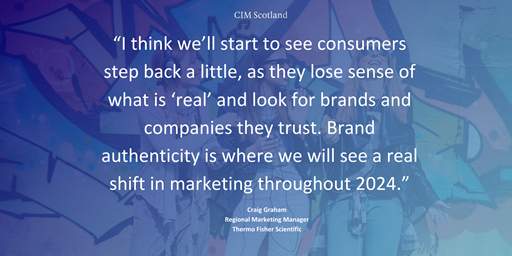
Growth of short form video
After AI, social video (such as on TikTok) was named the top consumer trend of the year, according to Mediaocean, with 57% of marketers saying it was the trend they were watching for.
It’s clear that TikTok is continuing to grow, and more brands are turning to the platform to reach their audience.
“There’s a growing trend of using TikTok for search and discovery, especially among younger generations. While Google continues to flood with AI generated articles, littered with pop-ups, paywalls and lengthy SEO-focused copy, the demand for short form video will continue to grow, offering a far more direct and engaging answer to many people. This could change the landscape for social media managers who typically wear many hats already and may now be expected to act as brand ambassador too,” suggests Richard Wardrop, Head of Marketing at Vault City Brewing.
The rise in TikTok for search is something that brands are becoming increasingly aware of: in 2022, Google’s Senior VP revealed that almost 40% of the 18-24 market went to platforms such as TikTok and Instagram to search before they went to Google. This has continued to rise, and throughout 2023 there has been a rise in people using social media (particularly TikTok) to search for ‘how to’ trends e.g. ‘how to fix’ or ‘how to make’. This is potentially because of the short and informative nature of these social platforms which mean people get the answers quicker than, say scrolling through blogs.
“This rise in social search will impact marketers by changing how they think – if they haven’t already begun a pivot. SEO needs to be integrated into their social posts and copy: we’re out of the aesthetically pleasing Instagram grid and into the era of infotainment, where content needs to provide answers while still not being bland. Marketers can search for ‘how to’ terms around their industry (as well as FAQs they are asked) and create social content that answers these, while making sure to mention the key terms in post copy, hashtags and voice overs for full SEO benefit,” is the advice of Ishbel Macleod, Head of Research and Insights at Hydrogen.
This ties back to the authenticity: creating content that answers questions the public want answers to.
All the changes suggested by our experts: thoughtful AI use, ethical marketing, and the rise of short form video all tie back to that one element…authenticity.
2024 will be the year that brands have to show who they are and what they stand for, in all their glory.

